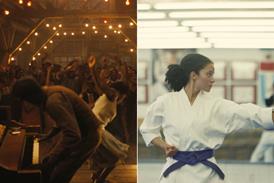Dir. Julian Schnabel. USA 2007. 83 mins.
Lou Reed’s bleak concept album Berlin was poorly received by public and critics on its release in 1973, but its reputation has built steadily since. Reed’s long-postponed plan to turn the album into a stage show was finally realised in December 2006, when Berlin played for five nights at St Ann ‘s Warehouse in New York , the first dates of what would become a selective world tour. Artist-director Julian Schnabel not only designed the set for the new show but was also on hand to film the concert: the result is Lou Reed’s Berlin , one of the most satisfying concert films since Jonathan Demme pretty much defined the genre with his Talking Heads movie Stop Making Sense.
But however auteurial a concert film is, its main audience is going to be fans of the featured artist rather than fans of the director. So Lou Reed’s Berlin will be lapped up by those dark, poetic and/or pretentious souls who (like the director) consider the album to be ‘the soundtrack of my life’, plus a few curious younger rockers.
Festival and specialised screenings will pave the way for limited theatrical distribution in some territories, while the film should enjoy a long DVD shelflife, along the lines of the 2005 concert film Leonard Cohen I’m Your Man (also based on a concert produced by impresario Hal Willner).
The concert features Reed himself as part of a 35-piece ensemble that includes regular rock musicians (including guitarist Steve Hunter, who played on the original album), a string and horn section, and members of the Brooklyn Youth Chorus. There’s a guest appearance from Antony Hegarty (frontman of Antony and the Johnsons), who performs a soulful version of Candy Says (one of three non-Berlin songs thrown in as encores).
Like Demme, Schnabel assembled his single filmed concert from several performances (five, in this case). And here too, the film has a kind of dramatic crescendo - though this has a lot to do with the rhythm and stage management of the concert itself, as well as the progression of Reed’s rock song-cycle, which charts the descent of Caroline and Jim, a young and carefree couple, into a spiral of drug-use, violence and eventual suicide.
But Lou Reed’s Berlin is much more intimate than most concert movies. There are no long-shots from the back of the auditorium: Schnabel’s cameramen (chiefly DoP Ellen Kuras, who also shot Neil Young: Heart of Gold) spend most of their time onstage, roaming around, focusing on details. It’s difficult to tell whether there was a digital phase before the final 35mm print, but one suspects so: there’s a grainy feel to much of the footage which suits the material, and compliments Reed’s gravelly voice.
Schnabel’s stage sets, based on recent paintings, play up the underground (at times underwater) feel of the warehouse surroundings and the claustrophobic, doom-laden atmosphere of the album. Silent footage shot on what looks like Super-8 by Schnabel’s daughter Lola is interleaved with the live concert action: it features Emmanuelle Seigner as an Edie-Sedgwick-like designer waif, but the scenes are short, well-placed, and impressionistic rather than bluntly narrative.
Berlin may sound like a soundtrack for a wrist-cutting party, but one of the nice things about Schnabel’s film is the way it transmits the energy of one of those concerts where everything comes together. Even impassive, stern Lou himself is wearing a huge smile on his face by the end.
Director, production design
Julian Schnabel
Production company
Waterboy Productions (US)
International sales
Fortissimo Films (Neth)
Producers
Jon Kilik
Tom Sarig
Co-producer
Ann Ruark
Executive producers
Stanley Buchthal
Maya Hoffman
Cinematography
Ellen Kuras
Editor
Benjamin Flaherty
Music
Lou Reed






















1 Readers' comment